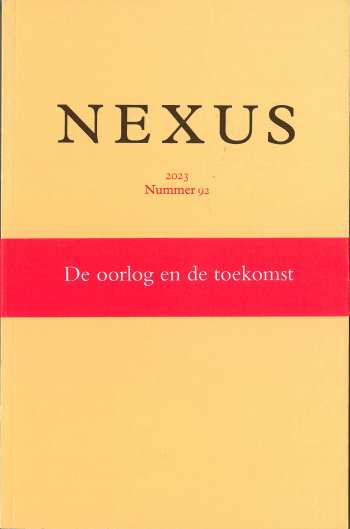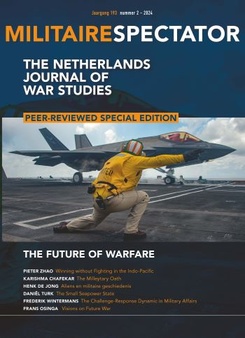Thinking about the future of war and warfare has been a subject undergoing intense study. In recent years various publications have been written and conferences organised on how experts and think tanks expect warfare to develop over time.[1] Future wars by way of, for instance, cyberattacks, could affect civil society as was the case during recent Russian and Chinese threats. Forthcoming wars could also lead to innovations, such as unmanned aerial vehicles and submarines infiltrating far behind enemy lines. Additionally, the role of Artificial Intelligence (AI) may increase in new conflicts. De oorlog en de toekomst (War and the future) is one of those publications focusing on possible future wars. To raise a tip of the veil, its authors predominantly chose an abstract, more philosophical, perspective than the examples mentioned above. Due to this perspective, the reader should not expect a collection of essays elaborating on tactical or operational military endeavours that contribute to the future of war.
Autonomous essays
De oorlog en de toekomst is the outcome of the annual Nexus Conference in the Netherlands. The Nexus Institute organised the conference in Amsterdam on November 19, 2022. This institute was founded in 1994 by humanist scholar Rob Riemen and focuses on studying European cultural heritage to shape and provide insight into the cultural-philosophical debate. In 2022, the conference’s central topic was ‘War and the Future’, in which sixteen international speakers sought to answer critical questions, such as ‘Why do wars scar our history?’ and ‘What is necessary to end a war?’.[2] Eleven of these presenters also contributed to the volume De oorlog en de toekomst.
The edited volume starts with an extensive paper by Nexus Director Riemen, followed by ten shorter essays. Riemen’s paper cannot be considered an introduction, nor does the book contain the conclusion of all contributions. The absence of these two elements essentially results in a volume consisting of eleven autonomous essays, which hampers the book’s readability. I will return to this matter in the final section of this review. Given the volume’s central topic, one could expect the contributors to have a history in the armed forces. However, only one of the authors has a significant (but brief and civil) background in the military, as far as is traceable through open sources.[3] The other authors came from the social sciences or had a career in politics or diplomacy. These backgrounds could explain the chosen angle in the book that differs – but is not unique – from other publications on war and the future. Ray Monk, emeritus professor in philosophy, was surprised when invited to address the Nexus Conference since he had never done so or written anything on war or the future. However, he published various bibliographies on intellectual greats of the previous century who struggled with the concepts of war and peace, such as J. Robert Oppenheimer.
In his essay, Monk argues that by researching the dilemmas these protagonists experienced, essential lessons can be extracted and applied to contemporary issues. The intellectual and (theoretical) physician Oppenheimer is known as former laboratory director in Los Alamos, where his team of scientists invented and developed two types of atomic bombs, which would later be dropped on Hiroshima and Nagasaki. After the impact of the bombs became visible, Oppenheimer left Los Alamos to focus on the eventual positive outcome nuclear bombs could have on the world. He believed that the devastating power of atomic bombs could rapidly end a war, but he also feared the nuclear destruction of humankind when such bombs were used irresponsibly. Monk concludes that Oppenheimer teaches us that we cannot neglect our responsibility for human history and that, therefore, we must do whatever lies within our ability to prevent the next war from happening.
Monk’s essay touches upon various recurring concepts and topics that feature throughout the Nexus collection: the fear and threat of nuclear weapons, combined with the continuous strife between Russia and the United States since the Cold War. In a worst-case scenario, this could eventually escalate into an apocalyptic end of time. The authors also mention the new role of the United States (and the West), especially since the U.S. lost its position as the sole superpower. This change in the geopolitical landscape could affect current and future conflicts. In contrast, the position of China regarding war and the future is a less often recurring topic. In their essays, the authors frequently connect the common themes to the Russian-Ukrainian War and whether it initiated a new phase in history. Donatella di Cesare, for instance, states in her essay that the European ideal of a sustainable and stable peace that followed the World Wars and crimes of the twentieth century evaporated with the Russian invasion of Ukraine.
According to Di Cesare, NATO was a considerable factor in starting this war. She emphasises the role NATO played in the increasing tensions and eventual war between Russia and Ukraine, as NATO continuously seeks to broaden its border in an eastern direction. This statement is, however, not convincing, as various experts discuss in the Clingendael Spectator. Despite the Russian perception expressed during the war, the deployment of NATO troops on its eastern border did not cause an increasing threat to Russia’s security. This was also not perceived as being the case in Russia before the invasion. Also, the later Russian course of action and rhetoric showed that the war did not imply causing a conflict with NATO. Instead, there was Russian wishful thinking to incorporate Ukraine into its territory, which Putin assumes to be ‘historical Russia’.[4]
Conclusion
To conclude, the authors of the Nexus volume chose to describe ‘war and the future’ from a philosophical and humanist perspective while looking through a geopolitical lens. The abstract angle does not make the book very readable to an audience interested in a practical way of looking at the future of war. Therefore, the book shall be more attractive to the general Nexus audience interested in the European humanist tradition rather than to those attracted to the effect of future warfare on the tactical or operational level. As mentioned in an earlier section of this review, it would be worthwhile for the reader to have a beginning and a closing part of the book. Most authors end their essays with a hopeful and comforting message about what they think could help prevent the next war from starting, mainly focusing on concepts such as humanism or democracy. The publication, however, lacks a conclusion that brings together these different messages and combines all essays into a more cohesive contribution to the existing debate. The reader should be aware of the alternative viewpoint and the lack of cohesion, but overall, they do not make the book less worth reading on the unfailingly intriguing topic of war and the future.
Lysanne Leeuwenburg MA, Netherlands Defence Academy
De oorlog en de toekomst
Rob Riemen (ed.)
Amsterdam (Nexus Institute) 2023
(Nexus No. 92) – ISSN 0926-2970

[1] Recent publications on this topic have, for instance, been The Future of War. A History by Lawrence Freedman (2017); White Sun War. The Campaign for Taiwan by Maj. Gen. (ret.) Mick Ryan (2023) and the Routledge Handbook of the Future of Warfare edited by Artur Gruszczak and Sebastian Kaempf (2023). In October 2022, the War Studies Research Centre (part of the Netherlands Defence Academy) and the Changing Character of War Centre (University of Oxford) organised The Future of War Conference in the Netherlands. The The Hague Centre for Strategic Studies and NATO Headquarters Supreme Allied Command Transformation held a symposium in the Netherlands as well on what the future of warfighting could mean for NATO in September 2023.
[2] Website Nexus Instituut.
[3] Presenter and author Mary Beth Long has been the Assistant Secretary of Defence in the United States of America. Two other presenters, William Fallon (a retired U.S. four-star admiral) and Radek Sikorski (Polish Minister of Defence between 2005 and 2007) did however not contribute to the edited volume. See Brochure Nexus Conference 2022.
[4] ‘Heeft het Westen de Russische invasie uitgelokt?’, Clingendael Spectator (September 2022). See: https://spectator.clingendael.org/nl/publicatie/heeft-het-westen-de-russische-invasie-uitgelokt.
